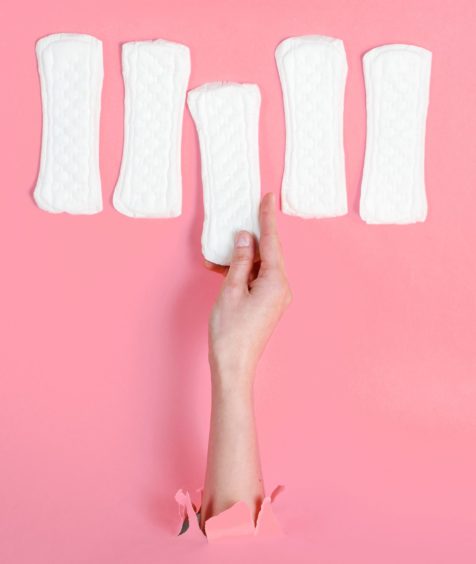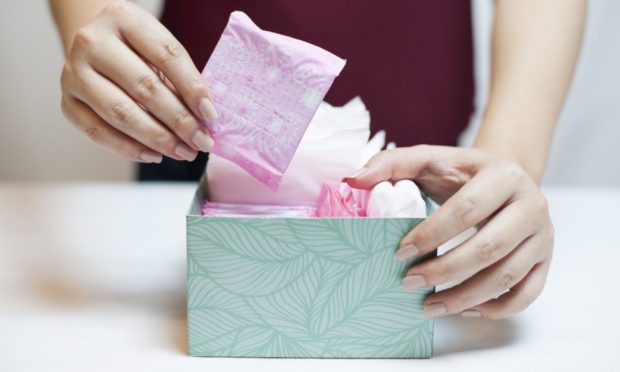Aunt Flo? Having the painters in? Aberdeen playing at home? There’s a myriad of clever expressions people have used through the years to describe menstruating – but are these euphemisms doing more harm than good?
It comes as a new study has revealed almost one-quarter of women have felt the need to lie to get time off work for PMS symptoms.
More than 2,400 people across the UK were surveyed, with 23% revealing they have made up an excuse for their bosses.
Many were worried about how others would perceive them if they needed time off work.
The study found 26% felt period pains or symptoms were not a valid reason to take a sick day, while 12% felt “inadequate” compared to female colleagues who did not seem to need time off.
Almost 20% said they felt self-conscious due to the subject itself, over issues including leaking or a heavy flow.

Another 13% were uncomfortable discussing the matter with colleagues, with 12% concerned they would be judged by male co-workers, and 11% worried they would be judged for underperforming while feeling “off their game”.
The research, conducted by period product brand Yoppie, showed 7% lied about their symptoms due to poor facilities in their workplace.
But why is this? Why are people still not comfortable about being open and honest about the severity of PMS symptoms?
Call it by its name: period
Professor Alice Butler-Warke, a lecturer in sociology at Robert Gordon University, said one of the reasons is the “huge issue” around the ability to talk “freely and openly using the word ‘period’.”
“I’m sure that you can think of many euphemistic expressions that society uses to refer to menstruating from ‘Aunt Flo’ to ‘having the painters in’ and ‘Aberdeen playing at home’,” she explained.
“When we don’t name something for what it is, we have internalised some of the stigma and shame surrounding that thing.
“But, there are lots of reasons why we may internalise and use those phrases ourselves. With stigmatised experiences, we often seek to deflect attention away from the experience and using a silly euphemism is one way to do that.
“Then we can think about the broader context in which menstruation and periods occur. Society is gendered and healthcare is gendered.
“Research suggests that women and nonbinary individuals may take longer to receive diagnoses and perceive that their health complaints are not taken as seriously.
“This means that in menstrual conditions like endometriosis, diagnosis takes on average seven years.
“That can be because the person experiencing symptoms may not have their complaints taken seriously, they may not seek treatment because they fear not being taken seriously or they may not know that their symptoms are not normal.
“The more we talk about menstruation or any stigmatised experience, the more normalised it becomes.”
Prof Butler-Warke also emphasised the negative effects, saying not being open about the topic could have “serious consequences”.
She added: “Enduring a stigmatising experience more generally can lead to feelings of isolation, stress, negative feelings, and in some cases can lead to more serious mental health concerns.”
Historical insight on period stigma
Prof Butler-Warke said there are many theories about why and how menstruation has come to be stigmatised.
Some arguments derive from a “revulsion around blood” while others argue it comes from “historical and faith-based explanations” for periods being, in some way, “impure and capable of contaminating others”.
She said: “Around the world, today, many women are ostracised during their periods.
“Existing gendered relationships in society lead to us thinking about society in certain ways and normalising behaviours and experiences as ‘pure’ or ‘impure’.
“Personally, I find one of the more troubling aspects of menstrual history to be the way that menstruation came to be framed as a hygiene issue rather than a natural bodily issue.
“In the 1920s and 1930s, menstruation was labelled in advertising as an ‘intimate problem’ and companies such as cleaning product company Lysol suggested that women clean themselves with chemical products to hide the ‘problem’ they were experiencing.

“Think about the way that pads, tampons, cups et cetera are still sold as hygiene product that in some way conceal from the rest of society that an individual is bleeding.
“The excellent academic Jill Wood argues that the imperative to ‘conceal’ menstruation is not a choice, but part of a bigger system of power relations that require people to hide this natural process.”
How can we normalise periods in everyday life?
Like with most societally ingrained issues, there’s no easy answer.
But Prof Butler-Warke says she “strongly believes” that as a society we can talk about it.
When it comes to creating a comfortable environment in the workplace, and helping to break down the taboo surrounding menstruation, she gave examples from around the world that have good practices around menstrual leave.
She said: “Zambia and Indonesia have policies of one or two days of leave available each month for those who are menstruating.
“Italy attempted to bring in a similar policy but that did not succeed. Individual companies are taking action, though, and myperiod.org offers a workplace quiz for employers to see if there are systems in place that create a period friendly workplace.
“Here in Scotland we are fortunate to have led the rest of the UK in the drive to provide free menstrual products in educational settings and this is such a huge help for reducing the stigma of period poverty which exacerbates stigma and shame.
“Myperiod.org suggests fostering a spirit of openness so that staff can talk easily and be open about all aspects of their life.”
She added: “Think about all of the times you have made up an alternative ailment rather than admit that you are experiencing cramps or other menstrual symptoms—why did you do that?
“What were you worried about? Why didn’t you want to discuss it? The more open you can be with friends, the more that we talk and talk about periods and menstruation, the more comfortable and more normalised it becomes.
“Some of my closest friends have thought about holding a small celebration with their daughters when they start their periods.
“This starts to shift the narrative away from one of shame to one of normalisation.”

